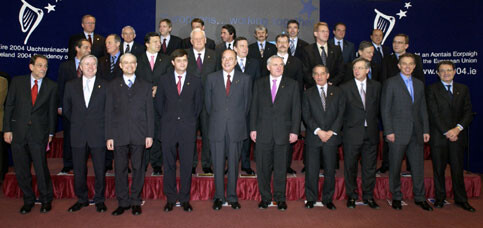26 March 2004

The European Council meeting in Brussels on 25-26 March 2004 (Photo: The Council of the European Union)
The European Union warned Israel today they will not recognize any change in the pre-1967 borders made unilaterally or resulting from the construction of the Separation Barrier. Leaders of the European Union met in Brussels on 25 and 26 March for its annual meeting on the Lisbon strategy and the economic, social and environmental situation in the Union. It also addressed a number of issues arising out of developments on the international scene, such as the Israeli-Palestinian conflict, Iraq, Afghanistan and Kosovo.
EXCERPTS PRESIDENCY CONCLUSIONS, 25-26 MARCH 2004
51. The European Council expressed its deep concern at the situation in the Middle East and the deepening of the Israeli-Palestinian conflict, following in particular the extra-judicial killing of Hamas leader Sheikh Ahmed Yassin. While having repeatedly condemned terrorist atrocities against Israelis and recognised Israel’s right to protect its citizens against terrorist attacks, the European Union has consistently opposed extra-judicial killings which are contrary to international law. The present cycle of retaliatory violence has caused widespread suffering and loss of life, has inflamed the situation and is taking the parties ever further from a negotiated settlement.
52. The European Council expressed its sympathy for those on all sides who endure the effects of violence or whose lives are disrupted by the conflict. It called on the Palestinian Authority to address the issue of security and combat terrorism and welcomed the Palestinian Authority’s announcement of plans for improving Palestinian security performance, stressing the need for full and proper implementation. It noted with particular concern the grievous humanitarian situation in the Occupied Palestinian Territories and called on the Israeli Government to take action to alleviate the suffering of Palestinians by lifting prohibitions on movement, reversing its settlement policy and dismantling settlements built after March 2001, and reversing the construction of the so-called security fence on Palestinian land.
53. The European Council confirmed its deep conviction that the Quartet Road Map, endorsed by UNSCR 1515, remains the basis for reaching a peaceful settlement. It called on all sides to refrain from further escalation and to take the steps required to begin the implementation of the Road Map. The most important step is for all sides to desist from all further acts of violence.
54. The European Council renewed its commitment to a negotiated agreement resulting in two viable, sovereign and independent states, Israel and Palestine, based on the borders of 1967, living side by side in peace and security, in the framework of a comprehensive peace in the Middle East, as laid out in the Road Map drawn up by the Quartet. The European Union will not recognise any change to the pre-1967 borders other than those arrived at by agreement between the parties.
55. The European Council noted the proposals for an Israeli withdrawal from the Gaza Strip. Such a withdrawal could represent a significant step towards the implementation of the Road Map, provided that, in accordance with the deliberations of the Council of 23 February: - it took place in the context of the Roadmap; - it was a step towards a two State solution; - it did not involve a transfer of settlement activity to the West Bank; - there was an organised and negotiated handover of responsibility to the Palestinian Authority; - and Israel facilitated the rehabilitation and reconstruction of Gaza.
56. The European Union stands ready to support the Palestinian Authority in taking responsibility for law and order, and in particular, in improving the capacity of its civil police and law enforcement capacity in general. The European Council tasked the EU Special Representative, in liaison with the Commission, to examine the requirement of the PA in this area and make recommendations for assistance.
57. The European Council called on the Israeli and Palestinian peoples to summon the political will necessary to overcome the current impasse in the peace process. Only through peace and reconciliation will Israelis and Palestinians realise their full potential.
58. The European Council reaffirms the need to deal with all the crises of the region within the framework of a global approach, which alone can ensure long-term security of the region. With that purpose, the EU will mobilise all its instruments and will develop its vision for stability in the region through the strategic partnership which it is seeking to establish with the Mediterranean and the Middle East. EU Strategic Partnership with the Mediterranean and the Middle East
59. The European Council welcomed the interim report prepared by the Presidency, the Council Secretariat and the Commission, entitled ‘EU Strategic Partnership with the Mediterranean and the Middle East’. The European Council underlined the importance of intensive consultation with the countries involved and welcomed the forthcoming attendance at the Arab League Summit by the Presidency and the High Representative as a clear demonstration of the commitment of the Union to developing this vital partnership.
60. The European Council looks forward to receiving a final report at its meeting in June 2004.
61. The European Council recalls the readiness of the EU to work with the US and other partners in cooperating with the region.
Related Links